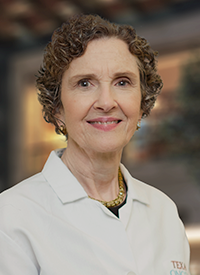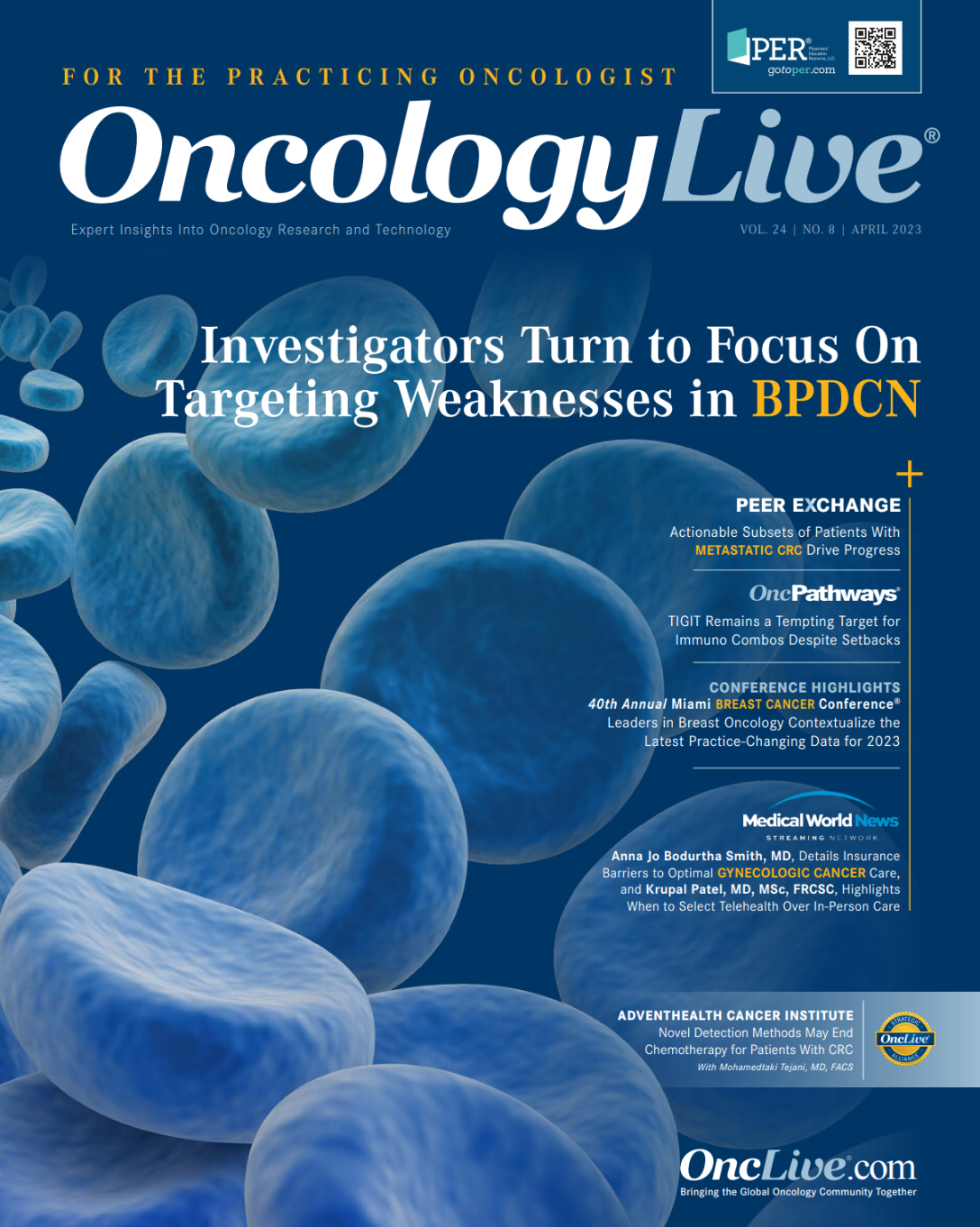Publication
Article
Oncology Live®
O’Shaughnessy Showcases Highlights in Breast Cancer Guiding 2023 IBC Congresses
Author(s):
Joyce A. O’Shaughnessy, MD, highlights multidisciplinary approaches including discussions on tumor boards, and discusses how to better assist patients with accessing care, and notable advances in the field particularly with the HER2 classification.
Joyce A. O’Shaughnessy, MD

As the field of breast cancer continues to rapidly evolve and shift with new therapies shaking up the paradigm, the 22nd Annual International Congress on the Future of Breast Cancer® (IBC) East and West conferences give clinicians the chance to debate treatments and ask pressing questions, according to the chair Joyce A. O’Shaughnessy, MD. IBC East is scheduled for July 14 to 15, and IBC West from July 28 to 29, 2023.
“Probably the biggest story in the past year is HER2-low being called out as a therapeutic subset of opportunity. We don’t think it’s a different biologic subset, but it certainly is a different therapeutic subset,” said O’Shaughnessy, who is the Celebrating Women Chair in Breast Cancer Research at Baylor University Medical Center and Director of the Breast Cancer Research Program at Texas Oncology, US Oncology in Dallas, Texas.
O’Shaughnessy also looks forward to the debates among colleagues across specialties at the meetings. “Not surprisingly, the surgeons don’t always agree with the radiation oncologist in terms of approach. I like to hear a difference of opinion and that’s what’s valuable for me: hearing it again in the context and then hearing it vetted so I can see how others feel this should be applied to practice.”
In addition to highlighting multidisciplinary approaches including discussions on tumor boards, O’Shaughnessy discussed how to better assist patients with accessing care, and notable advances in the field particularly with the HER2 classification.
How have the IBC conferences evolved over the years?
The IBC East and West are important multidisciplinary congresses aimed at bringing [the audiences] up to speed on new data, as well as vetting that data and figuring out how to integrate it into our practices. Breast cancer is not just medical oncology; locoregional care has a huge impact not only on locoregional control, but also without evidence of disease it can favorably impact distant recurrence as well. The locoregional issues are very rapidly evolving and there are new studies coming out for escalation and de-escalation strategies for surgical intervention and radiation. This is a constantly moving [target with] lots of global trials as well as with systemic approaches and risk reduction approaches and survivorship issues.
Of course, we have our national guidelines, but there are always nuances and it’s up to us to apply these new data and the guidelines to individual patients. You have to know the data and you have to have heard the new data discussed and debated— that’s the purpose of IBC East and West over the past 20-plus years since the congress has been in existence. The sheer volume of data has done nothing but get larger for example, novel diagnostics, liquid biopsies, next-generation sequencing, these simply didn’t exist 20-plus years ago. There’s increasing focus on multidisciplinary care in our institutions, and therefore at our meetings too.
What key takeaways do you hope congress attendees will leave with?
I love the data, I love the science, and I benefit from hearing the data presented by expert faculty who have, importantly, put it in[to] context with existing data.
I hope the attendees go back truly [thinking], “Oh, wow, I didn’t know that. I have to bring that to the clinic Monday morning.” We all have those “aha” moments when we go to and listen to our expert colleagues and see what they’re doing and [realize,] “I’m not doing that.” Those are the things that I get out of these congresses and that’s what I hope my colleagues will get out of [them].
What is the role of multidisciplinary care in breast cancer and how is it important for patients?
As I tell my patients, breast cancer management is always 2 parts. We must take optimal care of the locoregional area, the breast itself, and the surrounding lymph node beds. We have to get control of disease; you never want to see it back again. We also have restoration [and] reconstruction. Not every patient needs that, but that’s very important for overall well-being [and also] critically important for breast cancer control.
And then you need to have systemic management. There are still multidisciplinary issues around who could benefit from surgical management of the primary tumor, or which patients benefit from radiation management of the primary [tumor], as well as palliative radiation approaches or surgical approaches for the patient with metastatic disease. We always have the dual goals—locoregional management or management of a particularly morbid sight of metastatic disease, and general systemic management. Breast cancer is both at once.
[Multidisciplinary care begins when] patients usually see [the] surgical oncology and medical oncology [departments] immediately after diagnosis, particularly if they have stage II or III disease. Patients with stage I disease may begin with the surgeon and then [we] bring the medical oncologist [and] radiation oncologist in if the patient needs to go to surgery first. Otherwise, the surgeon will reach out to the radiation oncologist and the medical oncologist to get their consultation sooner [rather] than later. Of course, we have our tumor boards; most of us have weekly tumor boards where we will have a multidisciplinary discussion of either all patients or controversial patients where you hear different options [about] what we should do [and] what the team think[s] is the best approach for this patient.
What are typical multidisciplinary discussions that take place during the tumor boards?
The tumor boards are generally focused on early-stage breast cancer. The multidisciplinary work is most intensive in the early-stage breast cancer where patients are almost always going to get systemic therapy; they will get surgery almost always, and very often will get radiation therapy. You need breast imagers [and] pathologists.
In the metastatic setting, patients and medical oncologists get to know each other very well for many years. Generally speaking, most of the treatment there is systemic. There are issues in a subset of patients regarding control of the primary breast cancer and that means surgery and/or radiation therapy, or palliation of symptoms. Now there’s the new concept of oligometastasis or oligoprogression where patients have metastatic disease but it’s very small volume. How do you bring multidisciplinary care to the patient with oligometastatic or oligoprogressive disease? Through multidisciplinary care. Those are excellent patient [cases] to present at multidisciplinary tumor conferences as well.
What recent or notable changes have affected the standards of care across breast cancer?
Fortunately, [regarding HER2-low disease] it’s easy [to implement changes] because patients always have HER2 immunohistochemistry [(IHC) testing] done. We didn’t have to come up with a new diagnostic tool. But HER2-low [disease] is IHC 1+ or 2 expression by IHC and [fluorescence in situ hybridization] negative. We have a lot of those patients; it’s two-thirds of hormone receptor–positive, HER2-negative patients and it’s approximately one-third of triple-negative patients. It is by far the biggest subset of patients we have and it’s bigger than [the one with] hormone receptor–positive, HER2-negative [disease], which has always been our biggest group.
Right now, [HER2-low status is] only relevant in the metastatic setting; you have to have a therapeutic to make a diagnostic relevant and we have the antibody-drug conjugate fam-trastuzumab deruxtecan-nxki [Enhertu]. Trastuzumab [Herceptin] we’re all extremely familiar with, [and] we’ve had [ado-trastuzumab emtansine (Kadcyla)] T-DM1 for many years. Now we have trastuzumab deruxtecan with a different payload of a topoisomerase 1 inhibitor payload, but it’s a new option for patients and the key is that patients with hormone receptor–positive breast cancer still need to get optimal endocrine therapy.
Unfortunately, the cancer [eventually] becomes resistant to endocrine therapy [and] you have to go onto cytotoxic therapy. A lot of times we’ll use oral capecitabine, which is a very well-tolerated medication;, it’s a chemotherapy, a cytotoxic, [and there is] no alopecia [and] it doesn’t cause immunosuppression. Then we have to go to [intravenous] IV cytotoxic therapy and heretofore, we’ve only had 3 cytotoxic agents [and they] were more toxic because the cytotoxic agents are not bound to an antibody, which is [designed to be] more targeted and directed.
In the second line we will use trastuzumab deruxtecan for patients with HER2-low [disease] and this is a big advance. It’s very highly effective, it’s way more effective than single-agent chemotherapy, but it’s also less toxic in general in terms of how patients feel. You do have to watch out for interstitial lung disease. There’s a management surveillance strategy around interstitial lung disease because it’s very serious if it isn’t caught and treated early. But that aside, it’s more effective than anything we have for these patients in the second-line setting and it’s also very well tolerated [with] quite durable responses.
This is major now that trastuzumab deruxtecan has also been moved up into the adjuvant and neoadjuvant settings; it’s being brought into early[-stage] breast cancer. Of course, in HER2-positive breast cancer it’s been in clinical trials both preoperatively and in the adjuvant setting, but in HER2-low [disease] it’s also being evaluated as a substitute for chemotherapy or as an add-on for patients who need additional therapies in the curative setting.










